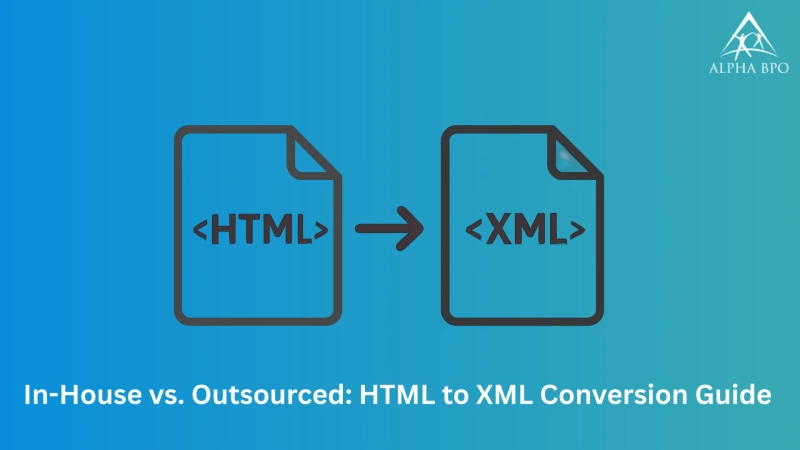For many businesses, adopting digital transformation and online tools has improved their ability to present their products and services, leading to greater success. With the well-designed and properly structured content on the website, businesses can attract their target audience compared to their competitors.
The emergence of tools helps institutions to maintain large data volumes, and the ability to store and structure this data effectively has become a top priority. One of the most common demands is HTML to XML conversion, which helps organizations structure their content into a more standardized format. This process creates a debate amongst the professionals whether the conversion should be managed by in-house teams or by assigning the responsibility to an outsourcing company.
Both proactive approaches that use XML conversion services have their unique advantages and challenges; the final decision depends on business objectives and available resources. This blog discusses the difference between the in-house and outsourced HTML to XML conversion process for better success.
The Significance Of HTML and XML In The Conversion Process
HTML is carefully designed to display information, while XML is created to store and transport data in a structured manner. Multiple businesses that want to move from one to another primarily seek conversion solutions to improve how data is shared, stored, and combined.
An XML file is more adaptable across different systems, which is the crucial reason why data in XML has become the popular choice in e-commerce, publishing, finance, healthcare, and other industries.
This process needs technical expertise and experience. It involves more than reformatting; it requires data tagging, validation, and accurate storage of creative content. Suppose these tasks are managed internally or by a data conversion company; the focus should remain on producing reliable data conversion results.
The Case For In-House Data Conversion Services
Some institutions prefer to rely on their internal house teams for HTML conversion and XML formatting. This preferred choice is primarily affected by a severe desire for greater control and alignment with existing business workflows.
Why Some Companies Keep Conversion In-House?
Many institutions choose in-house teams to convert standard XML to customized XML because of the control and closeness to primary business operations. There are solid reasons to keep data conversion work on-site and in-house.
Direct Control and Customization
Having the process managed internally by in-house expert teams allows for quick adjustments and customization of the workflow to the company's specific needs. High-level customization is simpler and easier when everything, including the conversion process, is kept on-site by internal expert teams.
Integration With The Primary Operations
When a company's expertise already lies in managing digital assets, well-formatted databases, and structured web content, executing XML conversion services internally can be a natural extension of primary resources.
Industry Compliance And Data Security
Sensitive data such as financial transactions, payment records, health information, medical details, or proprietary documents needs strict protection.
Choosing the data conversion in-house reduces the risk of data exposures and ensures industry compliance with excellent data security policies.
Challenges Of In-House Conversion
Limited Resource Scalability
Large projects with millions of records may saturate internal teams and strain them. Scaling up quickly to meet project deadlines is primarily difficult without external support.
Higher Conversion Cost
Maintaining software tools, skilled professionals, equipment, and infrastructure for data conversion services can be expensive. However, in many cases, the cost of maintaining and building a capable team overcomes the benefits.
Risks Of Lower Productivity and Efficiency
When employees are diverted from their key conversion responsibilities, the quality of both their primary work and the conversion process declines.
Choosing Outsourced Conversion Services
Working with an outsourcing company offers a stringent, cost-effective solution for various organizations. However, outsourcing XML conversion provides simple access to dedicated teams and the latest tools without the burden of creating the ability internally.
Why do Various Organizations Select An Outsourcing Company?
Outsourcing the XML process has become a standard option because it solves the limitations of in-house teams while offering specific advantages.
Maximum Cost Efficiency
Businesses should pay only for those services they need, compared to maintaining full-time internal in-house teams. This proactive approach of delegating XML conversion services to an external third-party provider reduces additional overhead costs and delivers better value.
Proven Expertise and High Quality Results
An outsourcing company focuses on data conversion, so they bring in-depth skills, expertise, and tested workflows. This activity provides high-quality results for the conversion tasks.
Quick Project Turnaround Times
Securely outsourced XML projects provide faster completion rates. With a dedicated data conversion company handling the conversion tasks, businesses can save time and meet tight project deadlines effectively.
Focus On Basic Business Operations
By outsourcing non-primary tasks like HTML conversion, businesses can free up internal data resources to concentrate on growth, innovation, and their primary operations.
Reliable Data Conversion Tasks
Outsourcing service providers use quality assurance checks and valuable tools to achieve higher accuracy in the conversion activities. This process results in reliable data conversion that can be directly used in multiple systems requiring XML format.
Potential Challenges Of the Outsourcing Approach
Dependence On Third-Party External Vendor
Heavy reliance on one provider may result in dependency. In this regard, it is necessary to select a trustworthy partner and maintain backups of all critical XML files.
Data Security Risks
Delegating the handling of data to an external vendor creates risks if proper protections and agreements are unavailable in the right place. Businesses should ensure their third-party service provider complies with data security standards.
Communication and Coordination
Managing severely outsourced XML projects requires clear communication to prevent miscommunications for smooth collaboration.
Comparing The Two Approaches For Better Selection
The final decision between in-house and outsourced XML conversion ultimately depends on task priorities. In-house teams may be more suitable when data security and confidentiality are significant concerns. However, outsourcing provides remarkable advantages when scalability, cost savings, and speed are necessary. There are various factors for comparison to summarize, such as:
- Expertise: Outsourcing companies primarily deliver more expert, specialized knowledge and high-quality results.
- Control: In-house teams offer greater control over conversion tasks, while outsourcing tasks relies on external data management.
- Cost and Budget: Outsourced XML is generally more cost-effective compared to in-house due to reduced overhead costs.
- Scalability: Outsourcing allows for rapid scaling of data for projects, while in-house teams may struggle with large volumes.
- Security: Sensitive conversion projects are safer in-house, though trusted vendors can also ensure compliance and industry regulations.
Make Better Informed Decisions With Precision In Data Conversion By Using XML Conversion Services
Suppose you select in-house teams or an outsourcing company for XML conversion, the final decision should align with your institution's goals, budget, objectives, and long-term digital strategy. In-house methods provide more control and stronger oversight of data security, but they come with higher costs and restricted scalability.
In contrast, outsourcing brings cost savings, expertise, and reliable data conversion, though it needs trust and careful vendor selection. Ultimately, the choice depends on your business project needs. Some businesses may even use a hybrid approach, keeping confidential projects in-house while sending large-scale or time-sensitive work to a data conversion company.
Understanding the potential advantages of both options allows you to make a well-informed decision that balances cost-effective solutions, high-quality results, and secure handling of your valuable data in XML format.
By carefully evaluating your requirements and exploring professional data conversion services, you can ensure efficiency, accuracy, and scalability in every transformation project.



